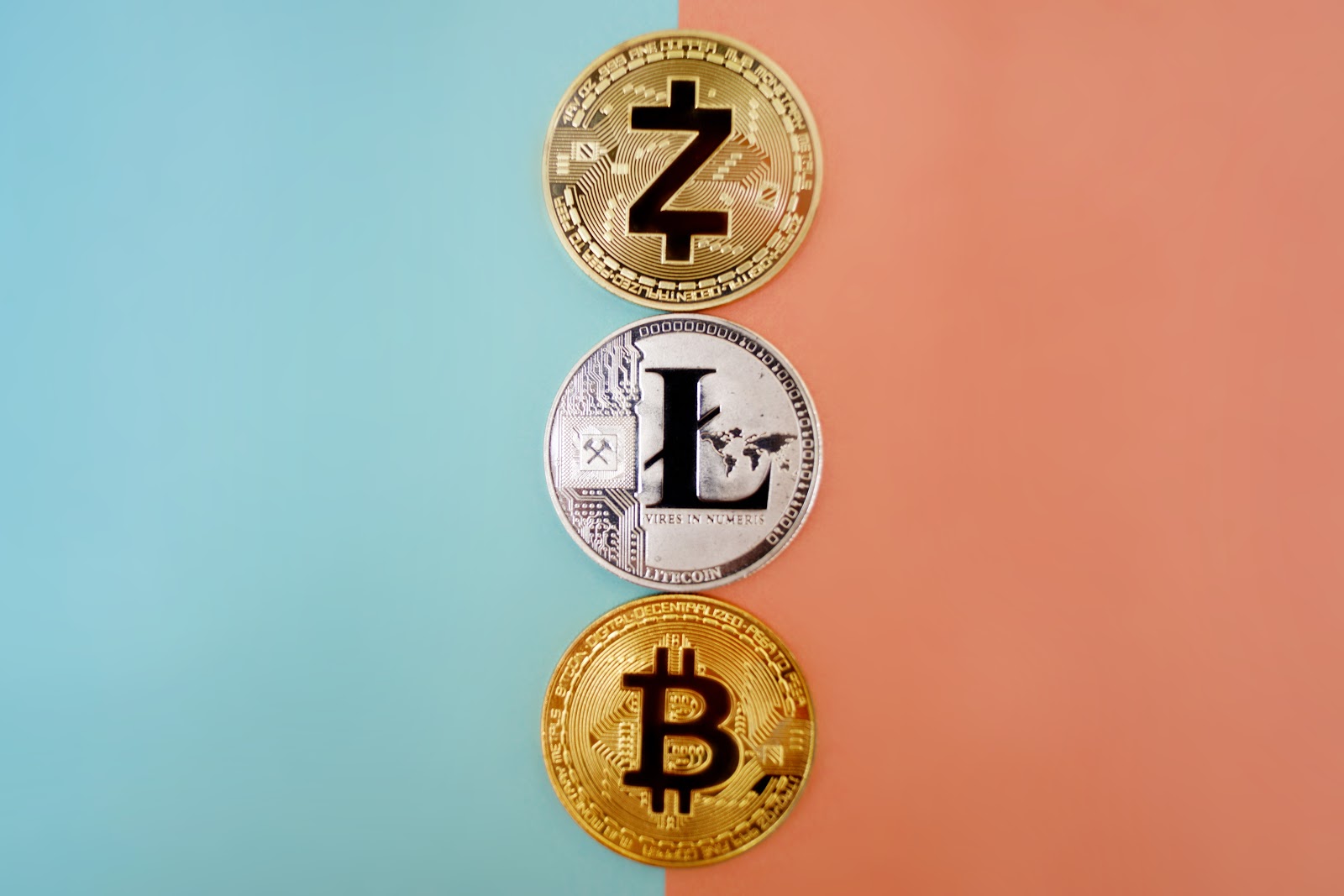
For those interested in digital currencies, It has changed the way we do business and the way investors invest in a company. Employers are offering crypto as pay and others, such as music artists, are accepting them in exchange for singles. The attention crypto has attracted made it popular among many. One the biggest reason why many are attracted to crypto is that many of them sit on a decentralised network. This means an organisation or a government does not control them, unlike Fiat currency. Ther is also no physical form of cryptocurrency, but it can be converted into the more familiar notes and coins we know and love.

The introduction of Bitcoin brought with it new technology such a blockchain. The nature of blockchain makes it a secure way of working, and we will go into more detail about it below. It is essential to mention, however, that not all countries share standard consensus o what crypto is. Some view Bitcoin as exchange tokens. Others view crypto in the same light as hard cash. These anomalies in the crypto world mean taxes for Bitcoin differ from country to country which why before investing, purchasing or dealing with crypto, it would be wise to find out the countries views on it.
A big part of making an investment in Bitcoin and other cryptocurrencies and being successful at it means learning the lingo. Here are some of the underlying crypto trading terms that are commonly used. Knowing these terms will help you navigate your way through the world of crypto in ease.
Blockchain is a decentralised and distributed public ledger which means it is a database that is validated by a vast community of people rather than a central authority. In most cases, blockchain refers to the bitcoin blockchain, which is made up of blocks. It allows data to be stored globally on thousands of servers and lets individuals enter the networks to see all the entries in real-time. By doing this, it makes it hard for users to gain control of the system. The immense reach of blockchain makes it harder to hack as all transactions are transparent for all to see. Falsifying a single record in the chain means you would need to forge the entire chain. Bitcoin transactions sit on a blockchain.
A wallet is a secure digital wallet that is used to store, send and receive digital currency like bitcoin. It is typically a string of numbers and letters. Many official coins like bitcoin have official wallets, but you can find wallets which hold different types of currencies in one place.
To use a crypto wallet users will usually be given an ID as a way to identify the wallet along with its own private key which will help to authenticate and prove possession of the wallet by the person who owns it.
To carry out a transaction with digital currency, you will need two things. The first is a wallet which acts as your address and a private key. The private key is a string of random numbers, but unlike address, the private key must be kept secret. The private key gives users authority to digitally sign and authorise different actions that are done by the digital identity when used with the public key.
The main priority when dealing with cryptocurrencies is to keep the private key secure. It the key gets lost or stolen; there is no means to recover it.
The order book displays current prices with volumes in real-time of current order from buyers and sellers.
The price at which a person is trying to sell an asset is known as the Bid Price.
The ask price is the price individuals are trying to buy an asset for.
A period during which asset prices consistently keep rising is known as a Bull Market. To get the most out of investments, users are likely to enter the market at the beginning or just before the start of a Bull market. This is so the assets they buy become more valuable.
In the flip side to the Bull market, a bear market is a period during which the prices of assets consistently fall. The silver lining to this si that the drop in prices means that entering the market becomes cheaper, and it becomes possible to buy the same amount of assets for a lower price. Generally, Bear markets are not specific to cryptocurrencies, and any tradeable asset can go through the same life cycle.
Spread is referred to as the price difference between the buy price and the sell price of an asset. The exchange between the individuals defines them.
When an individual wants to purchase an asset at a designated price, buy order or bids are created. When an individual wants to sell an asset at a selected amount, sell orders, or asks are created.
In a 24-hour trading cycle, high means the peak price Bitcoin or other assets have reached in 24 hours. And so low means the lowest price the particular assets has become in the 24-hour trading cycle.
The difference between the price a trader expects and the trade to execute at, and the price it eventually executes at known as Slippage.
The official completion of a trading process is known as Execution.
Storing digital money in an offline wallet is known as cold storage and usually stored on a platform that has no connection to the internet. There are many Blockchain smartphones which now have cold storage capabilities.
Satoshi, named after the creator of Bitcoin, is the smallest unit of Bitcoin (BTC) recorded on the blockchain.
The act of a transaction which is included in a single block within the Bitcoin blockchain is known as confirmation.
Like a fingerprint, a digital signature is an e-signature which is created by using the Publick Key Cryptography (PKC). The digital signature associates securely, a signatory with a document in a recorded transaction. Every transaction has a different digital signature that depends on the users private key.
Each Bitcoin transaction incurs a fee. It is processed by a miner who is paid for their services, and the Bitcoin network confirms the results.
Author: Yasmita Kumar
A little bit about me: I am a writer and have been writing about various topics over many years now. I enjoy writing about my hobbies which include technology and its impact on our everyday life. Professionally I write about Technology, Health and Fashion and previously worked for the NHS.
Open your free digital wallet here to store your cryptocurrencies in a safe place.
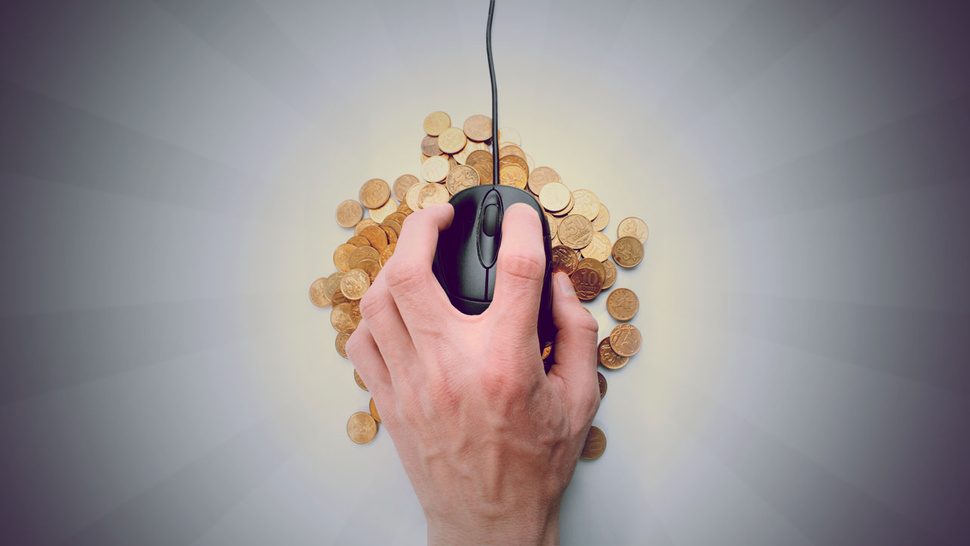
A few people daily ask us how to add more cryptocurrencies to HolyTransaction.
We currently accept more than 10 digital currencies, but sometimes you cannot see them all when you open your account on HolyTransaction.com.
To see the whole range of digital currencies you can store on your multi-currency wallet and see all the addresses, please read this step-by-step guide.
It is really easy and you will think: “Oh my, how didn’t I think about it?”.

3. So now you will be able to the see the full list of digital currencies you can store on HolyTransaction:

4. You can select all the digital currencies you need. This way you will be able to see the new addresses on the main page of your wallet.
If you want us to add more digital currencies on our wallet, please contact us via email at [email protected] with more info about your crypto.
Open your free digital wallet here to store your cryptocurrencies in a safe place.
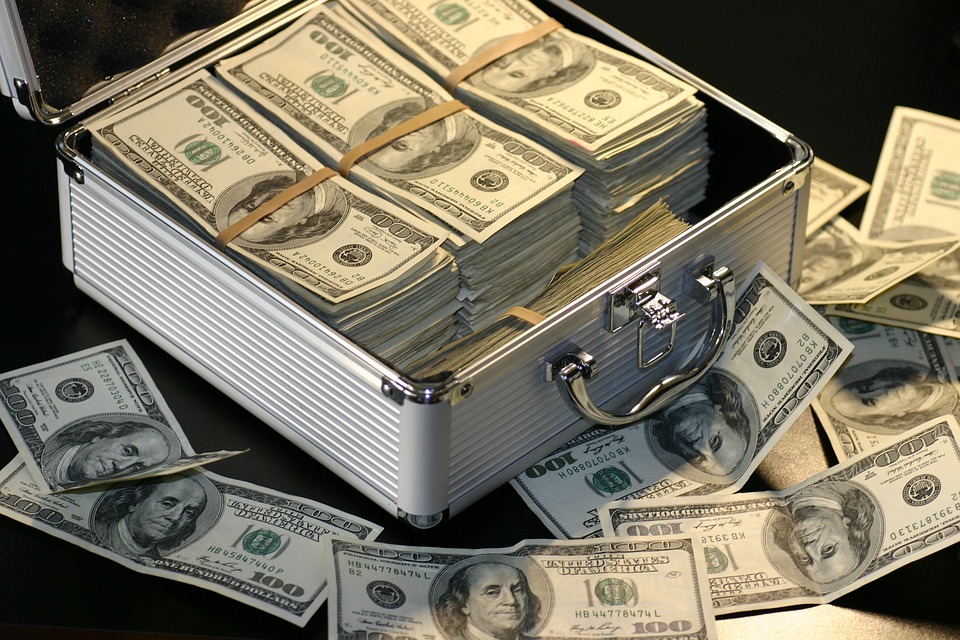
How to buy bitcoin with bank accounts? Read this step-by-step guide to convert your fiat currencies into your favorite digital currency.
We recently opened a new service called HolyTransaction where you can buy and sell bitcoins.
This is an important feature when you need to buy or sell bitcoin immediately. You just need to create an account on HolyTransaction.
You just need to visit HolyTransaction and follow the process you can read below.
This guide will enable you to buy bitcoin with bank account.
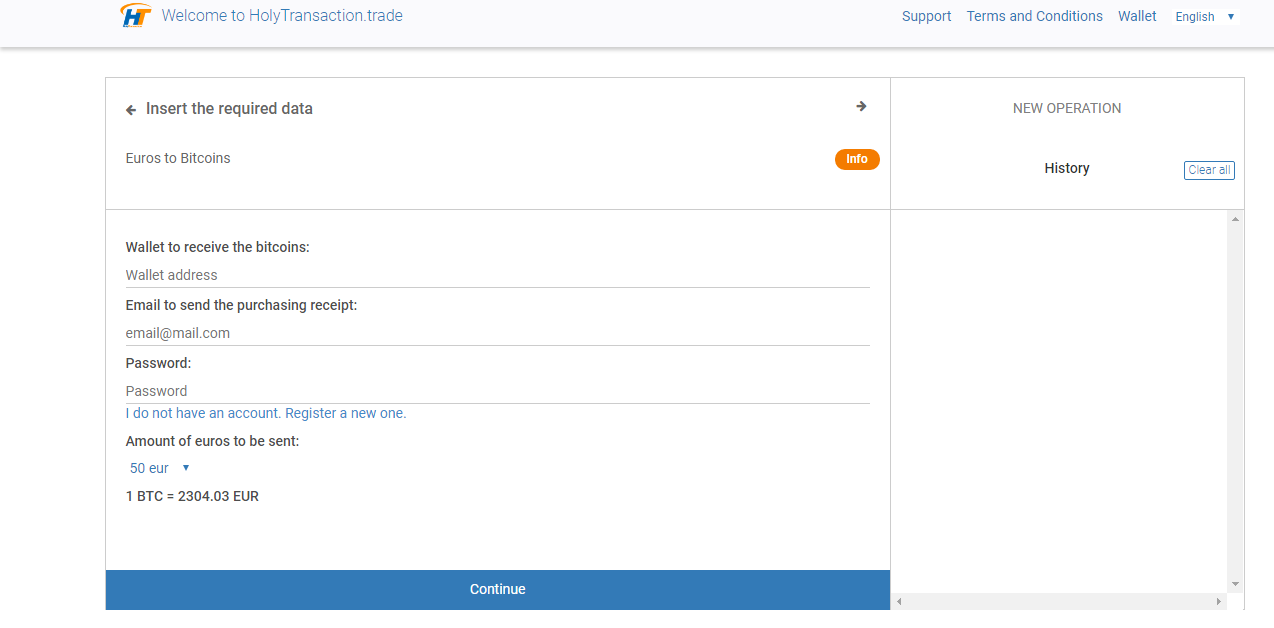
5. Insert the amount that you want to transfer for your purchase and then click “Next”
6. Wait for the validation of your order. This process of verification will one or two minutes.
6. Then you will need to pay the amount of EUR you decided, so you need to order the bank transfer from your bank account. You will see the IBAN where you need to send the fiat currency to and you must include the reference.
7. Then you will see a countdown that starts from 48h. At the end of that, the operation will be completed. You will see a similar image as shown below:
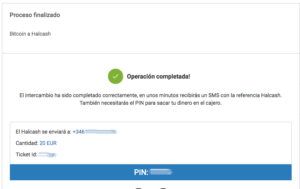
NOTE: the max amount you need to buy daily is 4500 EUR. Bank transfer needs 48h to be received.
Open your account on HolyTransaction here
Open your free digital wallet here to store your cryptocurrencies in a safe place.

If you want to increase your HolyTransaction daily limit for withdrawal and transaction this is the guide you need.
This process is directly linked to the 2FA (two factor) setup, so if you want to increase your limits, you will have to improve the security of your wallet first.
If you don’t have your 2FA activated, the limit is 2,000EUR, but if you decide to setup it, you can increase your daily limit.
So, after you successfully set up your 2FA with Google Authenticator, you just need to contact us via email and ask us for the increasing.
In fact, this is not an automatical process.
Read the procedure I’m going to show you to increase your HolyTransaction daily limit.
Click here to read a full explanation with pictures.
Open your free digital wallet here to store your cryptocurrencies in a safe place.
Open your free digital wallet here to store your cryptocurrencies in a safe place.
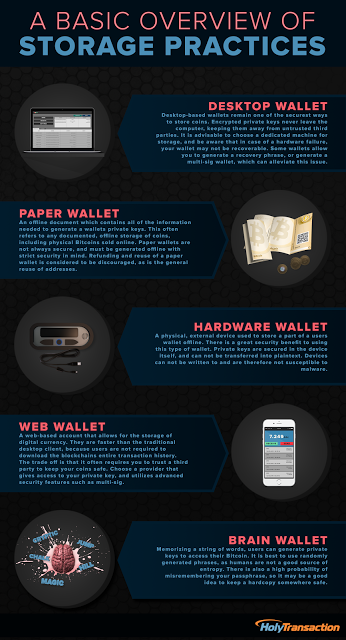
Open your free digital wallet here to store your cryptocurrencies in a safe place.
LUISS ENLABS in collaboration with Bitcoin Foundation Italia and
Codemotion presents the first of a series of technical conferences
“Bitcoin ~ Hands On Code”.
The event will take place on Wednesday, 2nd of July, from 4pm to 8pm and enjoys the participation of speakers Thomas Bertani, Founder&CEO BitBoat Ltd, Guido Dassori, IT&building automation Freelancer, Luca Matteis, Semantic Web Developer, as well as Francesco Simonetti, Andrey Zamovskiy, Nickolay Babenko in live streaming from San Francisco.
The mission of the conference is to remove friction between bitcoin and
developers, encouraging the development of an appropriate tech scene
around Bitcoin, an incredible open-source based technology, aiming to
disrupt finance and money as we know them today.
There’s an
enormous opportunity for developers, who are already jumping in and will
have a real impact on the future, contributing to this open-source
technology.
Jump on board!
Program:
16.00 – Welcome: Tobia De Angelis, Augusto Coppola
16.15 – 17.15 – Panel moderated by Franco Cimatti, Developer and President of Bitcoin-Italia: Speakers’ interventions
17.15 – 17.30 – Break
17.30 – End (Around 20.00) – Hands on Code, guided by Thomas Bertani, a developer with a deep expertise in bitcoin/blockchain and founder of BitBoat.net.
Open your free digital wallet here to store your cryptocurrencies in a safe place.
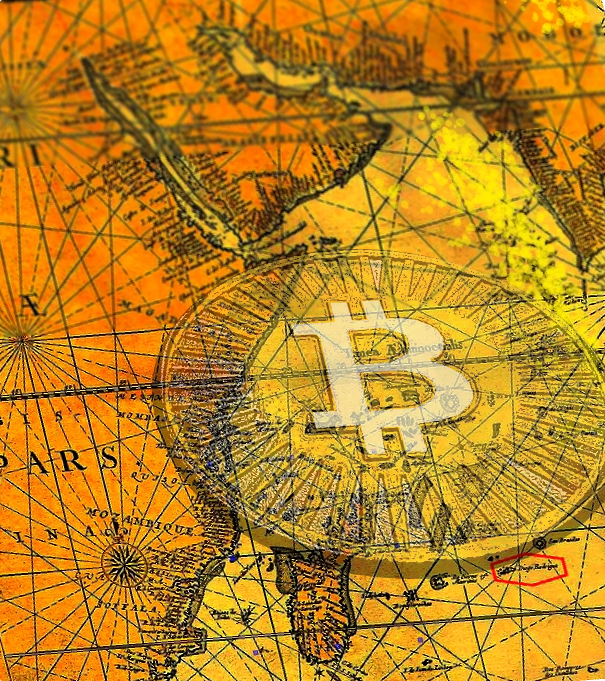
An intrinsic
theory of value (also called theory of objective value) is any theory
of value in economics which holds that the value of an object, good or
service, is intrinsic or contained in the item itself. Most such
theories look to the process of producing an item, and the costs
involved in that process, as a measure of the item’s intrinsic value.
Open your free digital wallet here to store your cryptocurrencies in a safe place.

7. Spend bitcoin with smart phones for everyone
12. Gambling once accounted for most transactions
17. Robbing money may become obsolete
18. It can stop identity theft
19. No permission required
This list is only the start. Look into the amazing bitcoin and report
back your own found mind-benders in the comments section. Then play
bitcoin trivia with your friends – they may not believe you.
Open your free digital wallet here to store your cryptocurrencies in a safe place.
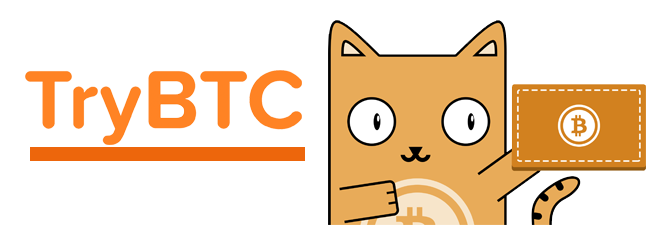
Open your free digital wallet here to store your cryptocurrencies in a safe place.